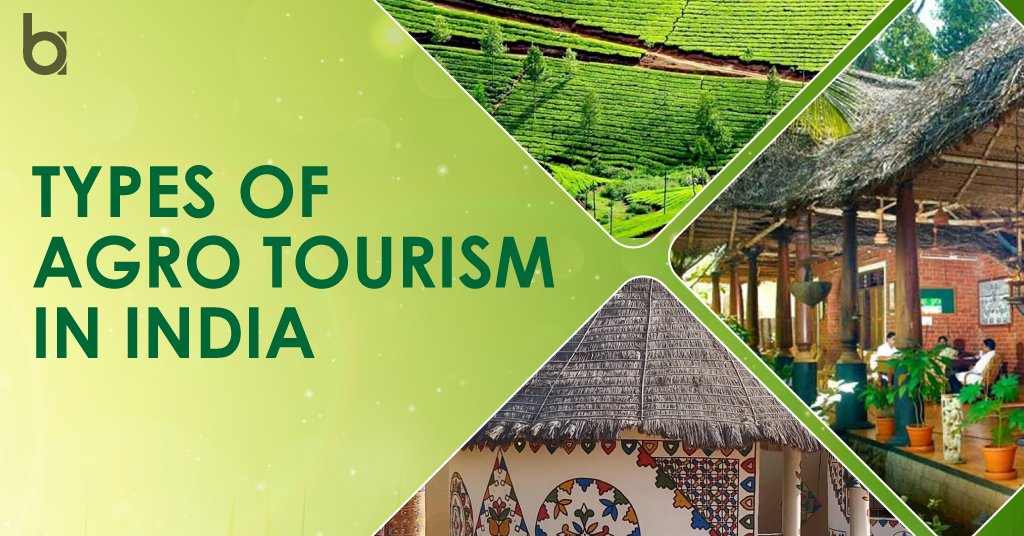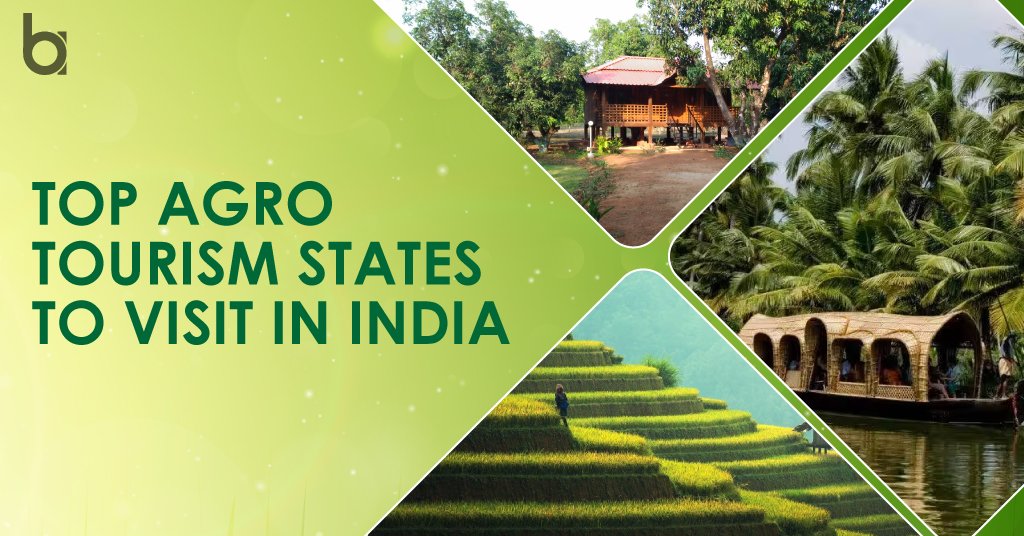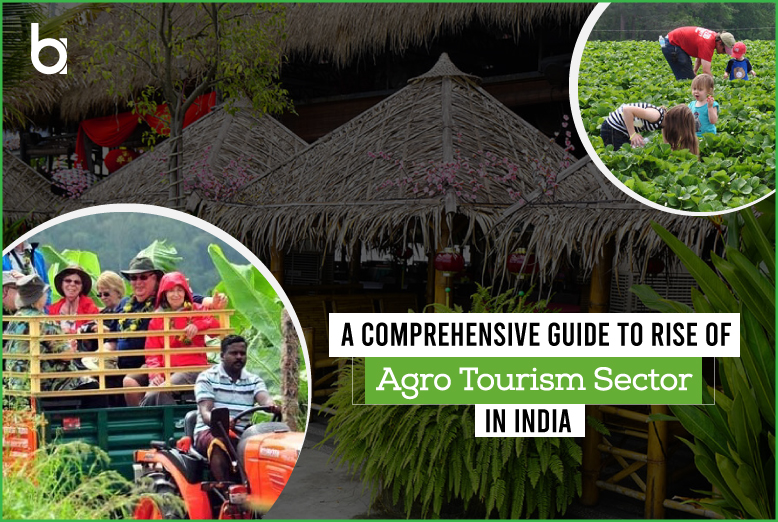India is not just huge and diverse in that it accommodates hundreds of foods and places for all types of travelers but also abounds in tons of landscapes and cultures. This is why India remains one of the hottest destinations for tourists the world over. It has people traveling to see all things from the most sacred pilgrimages to massive hilly terrains out to those shiny beaches.
India welcomed close to 10.93 million foreign tourists in 2019, but the number was just 6.19 million in 2022 due to the COVID-19 pandemic. The predicted increase within the coming few years will spur governments to develop new strategies toward this attraction. One such strategy could be agrotourism.
Agro tourism Explained
Agro tourism is visiting farms, agricultural land sites, and rural landscapes. The nature of farming, farm operations, farmhouse stay- and engaging in farm activity and rural life is known as agritourism. It is a peculiar type of tourism through which tourists can learn, engage, and watch agricultural practices, methods of food production, and the way of life in rural environments.
Tourists usually participate in recreational activities during vacations or holidays. Agritourism sites include work farms, vineyards, orchards, ranches, and various other agricultural-related sites.
Purposes of Agro tourism
The primary aim of promoting agro-tourism is to facilitate educational and fun holiday trips for tourists. This is also an additional source of income and another way of developing local farmers and rural societies besides promoting sustainable agriculture and preserving cultural exchange. Visitors often engage in activities like picking fruits, vegetables, or grapes at an agritourism site. They also have farm chores to perform along with farm tours and thus can enjoy farm-fresh food and products. They even learn more about traditional agricultural methods.
Why is agro tourism popular in India?
In India, the status of agro-tourism remains high due to ancient natural pulses, numerous farming practices, and authentic cultural experiences that build agro-tourism. More than 60% of the Indian population depends upon agriculture, and it gives appeal to agro-tourism in India. Traditional rural life, varied farming practices, and farm-to-table experiences such as harvesting food and milking cows draw people who want to participate in agricultural tourism on the spot. Agro-tourism offers education about agriculture and sustainability as well as an escape from the hustle and bustle of cities.
In addition, this industry brings economic development in rural areas regarding interests in sustainable and responsible tourism, which are on the rise. Thus, supported by the Indian government, agro-tourism also grows, making India an even stronger country concerning its agricultural diversity as well as cultural richness. Now it is becoming very attractive for internal and international tourists.
The IMARC report said that when operating at 19.9%, Indian agriculture and tourism would register a CAGR by 2023-2028. How much potential there may be for businesses getting developed there for holidaymakers, let’s discuss that as we understand agro-tourism in India.
Types of Agro Tourism in India

Each type of agro tourism in India offers a distinctive experience, allowing visitors to connect with nature, understand local culture, and gain insights into the country’s agricultural heritage. Moreover, these diverse options make India an attractive destination for tourists seeking authentic and enriching rural experiences.
- Culinary tourism: This type of tourism centers around food experiences and culinary traditions. Tourists can indulge in farm-fresh meals, cooking workshops, and local produce and regional dishes tastings.
- Wine and vineyard tourism: India has a growing wine industry, particularly in regions like Nashik in Maharashtra and Karnataka. Wine and vineyard tourism allows visitors to explore vineyards, learn about winemaking processes, and sample different wines.
- Tea estate tourism: India is renowned for its tea production, and tea estate tourism allows tourists to visit tea plantations in places like Darjeeling and Assam. They can witness tea plucking and processing and learn about the tea culture.
- Spice plantation tourism: In Kerala and other southern states, spice plantation tours offer visitors the chance to explore aromatic spice gardens, learn about various spices, and understand their culinary and medicinal uses.
- Fruit orchard tourism: Certain regions in India, like Himachal Pradesh and Uttarakhand, offer fruit orchard tours where tourists can pick fruits, enjoy scenic landscapes, and experience rural agricultural life.
- Ayurveda and wellness tourism: This form of agro tourism focuses on traditional Ayurvedic practices and wellness therapies. Moreover, tourists can engage in rejuvenating treatments and yoga retreats, as well as learn about Ayurvedic medicinal plants.
- Sustainable and eco-tourism: Some agro tourism initiatives focus on promoting sustainable and eco-friendly practices. Tourists can participate in eco-friendly farm activities, learn about conservation efforts, and support responsible tourism.
- Rural craft and art tourism: This type of agro tourism involves visiting rural artisans and craftsmen to learn about traditional crafts like pottery, weaving, and handloom work and purchase unique handmade products.
- Adventure tourism: Adventure tourism offers tourists the opportunity to engage in various outdoor activities amidst rural landscapes. These activities often involve exploring nature and agricultural areas in an adventurous and active manner.
Benefits of the Industry
Agro tourism in India promotes a symbiotic relationship between agriculture, tourism, and local communities. It fosters sustainable development, cultural understanding, and economic success while safeguarding the country’s natural and cultural heritage.
- Economic Boost: Agro tourism generates additional income for farmers and rural communities, helping to diversify their revenue sources. It also creates employment opportunities through various services like farm stays, guided tours, and local crafts, contributing to the growth of the local economy.
- Agricultural and Environmental Sustainability: Agro tourism encourages sustainable agricultural practices as farmers often showcase eco-friendly methods to tourists. This fosters awareness about responsible farming. Moreover, it emphasizes the conservation of natural resources and the importance of biodiversity preservation.
- Cultural Exchange and Social Integration: Agriculture tourism facilitates cultural exchange between tourists and local communities. Thus, visitors gain insights into rural traditions, festivals, and customs, promoting mutual understanding and appreciation of diverse cultures. This social interaction helps bridge the gap between urban and rural populations.
- Preservation of Rural Heritage: Agro-tourism plays a role in preserving traditional knowledge, crafts, and skills that might otherwise be at risk of fading away. By valuing and showcasing rural heritage, it helps maintain cultural identity and heritage for future generations.
- Health and Well-being: Agro tourism promotes physical and mental well-being through outdoor activities, such as hiking, biking, and farm-related tasks. It provides a refreshing escape from urban life, offering tourists a chance to connect with nature and experience a healthier lifestyle.
- Conservation of Agricultural Land: Farmers may be incentivized to maintain their agricultural lands instead of converting them into non-agricultural uses by promoting agro-tourism. This helps protect valuable agricultural resources and prevent further urban sprawl.
Top Agro Tourism States to Visit in India

There are quite a few beautiful tourist places in India, each with a different profile of agricultural landscape, cultural resources, and adventure potential. Let me tell you some great states to visit
- Maharashtra: With all said and done, agro tourism in Maharashtra is rooted in its age-old practice of exquisite agriculture, including not just rearing several crops but also milk produce. A homestay gives an idea of rural life, whilst a heritage tour shows you all about the state’s cultural splendors. For the adventurers, Maharashtra has different Sahayadri mountain ranges and travels to scenic Konkan.
- Kerala: Kerala amazes every tourist he/she goes on his trip with the green hills and still backwaters. It also provides the opportunity to stay at a farm surrounded by dense plantations, participate in tours to heritage sites, learn about the state’s cultural heritage, and traverse adventure activities, including hiking and river rafting.
- Himachal Pradesh: Located in the northwest corner of the north Indian state, Himachal Pradesh mesmerizes its viewers with its awe-inspiring mountainous terrain amidst forests and valleys. Also, agro-tourism gives a touch of agriculture to the visitors, as they can try living a rural life through farm stays. On top of that, there are several treks across the hills and camping in the wild.
- Uttarakhand: Thanks to its pristine mountains, divine rivers, and dense forests, Uttarakhand creates a miraculous experience for every tourist. Explore fallow hills, trek through picturesque trails, and what to do on a river rafting experience.
- Tamil Nadu: With a substantial variety of agriculture and rich greenery, Tamil Nadu is a great destination for Ag-Nvap tourism. Explore the Nilgiris for tea and coffee plantations. Also, check out the spice gardens in Kerala to find traditional farming practices held on the rural lands.
- Assam: Tea plantations in the state will give you an idea about the production and processing of Tea. Also, tourists can walk in the footsteps of tribal communities’ rural life and feast on some traditional Assamese cuisine.
- Karnataka: The land of contrasting landscapes that possesses all possible flavors (be it beaches & jungles or expanses of farmlands). Karnataka has a rural appeal, like Coorg coffee & spice plantations and Malnad region cafeterias
Agro tourism near Pune & Other States
| Agro-Tourism Location | Location | Best Time to Visit | Activities | Cost (INR) | Accommodation |
| Pitambari Agro Tourism | Near Pune | Oct – Mar | Farm tours, village walks | ₹1,500 – ₹3,000 | Homestays, Tented Camps |
| Shivsagar Agro Tourism | Tapola, Mahabaleshwar | Oct – Apr | Boating, trekking | ₹2,000 – ₹4,500 | Farm Stays, Eco-cottages |
| Janki Agro Tourism | Near Pune | Nov – Mar | Nature walks, workshops | ₹1,500 – ₹3,500 | Cottages, Farm Stays |
| Mauli Agro Tourism | Near Pune | Nov – Feb | Farming activities, village tours | ₹1,500 – ₹3,000 | Homestays, Eco-cottages |
| Baliraja Agro Tourism | Near Pune | Oct – Feb | Village tours, trekking | ₹1,000 – ₹2,500 | Tented Camps, Homestays |
| Sheru Agro Tourism | Near Pune | Dec – Mar | Animal care, cooking classes | ₹1,200 – ₹3,000 | Tented Camps, Homestays |
| K K Agro Tourism | Near Pune | Sep – Mar | Camping, nature walks | ₹2,000 – ₹4,000 | Farm Stays, Tented Camps |
| Sahyadri Agro Tourism | Near Pune | Oct – Mar | Eco tours, farming workshops | ₹1,800 – ₹3,500 | Cottages, Tented Camps |
| Gulmohar Agro Tourism | Near Pune | Nov – Mar | Organic farming, nature walks | ₹1,500 – ₹3,000 | Homestays, Eco-cottages |
| Vasundhara Agro Tourism | Near Pune | Oct – Mar | Bird watching, cooking classes | ₹2,000 – ₹3,500 | Tented Camps, Homestays |
| Sikkim Agro Tourism | Sikkim | Oct – Mar | Tea garden visits, trekking | ₹3,000 – ₹6,000 | Homestays, Resorts |
| Kerala Agro Tourism | Kerala | Nov – Mar | Farm visits, cooking classes | ₹2,500 – ₹5,000 | Eco-cottages, Homestays |
| Tamil Nadu Agro Tourism | Tamil Nadu | Oct – Mar | Agricultural tours, nature walks | ₹2,000 – ₹4,000 | Farm Stays, Tented Camps |
| Madhya Pradesh Agro Tourism | Madhya Pradesh | Oct – Mar | Rural tours, wildlife viewing | ₹1,500 – ₹3,500 | Homestays, Lodges |
Factors Driving India’s Agriculture Tourism

Some factors are fuelling the progression and development of the agro-tourism market in India:
- Tourists interested in sustainable tourism: Tourists want what they need, and sustainable tourism is helping both key points to harmonize increasing demand. Hence, the ideas in agro-tourism with respect to sustainable farming practices and rural experiences are rooted in this kind of trend.
- Growing Farm Stays: Farm stays are becoming increasingly popular with tourists these days; they are all about giving a taste of rural life and providing employment to agriculturists. Experiences that are real keep travelers coming—better experiences in how they relate to authentic nature and local culture.
- Government initiatives to popularize rural tourism: Agro-tourism market growth is mainly fueled by proactive efforts implemented by the Indian government aimed at the promotion of rural tourism.
The government, in order to stimulate and promote rural initiatives, hence supports economy-related as well as tradition-related status.
Final Thoughts
India Agro Tourism: An initiative that gives an enticing rural experience to its tourists. Unparalleled agricultural landscapes and a genetic extravagance then, at that point, plenty of tourists can partake in farm stays, taking a discourse on sustainable practices, or joining a community stay to bond with city and country dwellers.
So in the case of adventure tourism, states like Kerala and Himachal present an opportunity, and Rajasthan offers the impact of the Green Revolution. Whether it is tea gardens in Assam or spice plantations in Karnataka, there are innumerable experiences all across the states. This rural tourism form of sustainable and educational tourism helps the local economy, serves ecosystem services, and also brings cultural resonance to the countryside of India.
FAQs
1. Who is the founder of agrotourism?
The individual who first used the word “agro-tourism” back in 1983 is Klaus Obermeyer, an American, and therefore most people consider him the founder of agro-tourism.
2. Who is the Father of Agri-tourism in India?
The one and only founder of agritourism in India, Pandurang Taware, “Father of Agritourism. He has been a leading personality in developing agri-tourism and has a range of awards and recognitions in this field. He was awarded with National Tourism Award by the Vice President of India in 2010 as an example. Pandurang Taware, founder and managing director of Maharashtra State Agri Rural Tourism Co-operative Federation Ltd. He is also trying to make a global body that stimulates Agri-tourism.
3. Which country is famous for agrotourism?
In recent years, The agro-tourism concept has been widely discussed in agricultural development in many countries. On the one hand, India, Australia, and Malaysia of the USA are the destinations that get popular tourist destinations. This is all set to get done in the right place, as infrastructure and government policies build a ladder for agro-tourism in India.
4. What is the full form of Agro?
Agro is an abbreviation of agronomy or agriculture. An agro-prefix in English just means “field,” “soil,” or “agriculture,” but in English, we speak by using this shortened form.
ALSO READ: Top 10 Indian Healthcare Companies that Furnish the Best Medicaments













